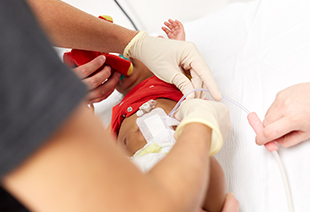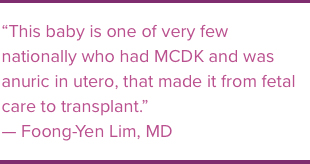Innovative Care for Complex Multicystic Dysplastic Kidney Patient Results in Promising Patient Outcome

Coordination Spans Intervention In Utero to Successful Kidney Transplant
It sometimes takes a village to help a baby survive and thrive. For Baby E, diagnosed prenatally with left multicystic dysplastic kidney (MCDK) and absent right kidney, the collective expertise of Cincinnati Children’s fetal care team, nephrologists, urologists, transplant surgeons and many others has been life-giving and life-changing.
“This baby is one of very few nationally who had MCDK and was anuric in utero, that made it from fetal care to transplant,” says Foong-Yen Lim, MD, surgical director of Cincinnati Children’s Fetal Care Center.
The fetal team discovered at 21 weeks’ gestation that Baby E had only a single kidney, and it was nonfunctioning. Maternal-fetal specialists at University of Cincinnati Medical Center intervened by injecting fluid into the womb eight times to restore amniotic fluid and allow her lungs to develop. As Baby E matured, Dr. Lim coordinated teams of specialists at the two hospitals and provided a bridge from prenatal to postnatal care.

“Only a few centers in the country are willing and able to provide this level of care,” Lim says. “No single individual can make this happen. It has taken us seven years to build a mature multidisciplinary team to care for these patients with severe kidney deficiencies.”
Baby E was born preterm at 33+ weeks, stabilized, intubated and transported to Cincinnati Children’s. Fetal Care Nurse Coordinator Mel Minges, BSN, supported Baby E’s family before, during and after the transition.
Pediatric nephrologist Donna Claes, MD, and her dialysis team coordinated a progression from hemodialysis to peritoneal dialysis. She worked closely with Fetal Care Center Neonatal Director Stefanie Riddle, MD, until Baby E was discharged to home after four months. The multidisciplinary team guided the family over the next two years with home peritoneal dialysis, a gastrostomy tube and medications, and maintained contact during hospitalizations, surgeries and clinic visits.
In the spring of 2021, at age 25 months, Baby E received a kidney donated by her mother. David Hooper, MD, medical director of Kidney Transplantation, coordinated with pediatric transplant surgeon Greg Tiao, MD, who performed a successful living donor kidney transplantation.
Pediatric urologist Pramod Reddy, MD, joined the procedure to perform a ureterostomy, connecting Baby E’s ureter to a stoma in her abdomen. Reddy’s team also had provided prenatal counseling and will discuss options for reconstructing the child’s urinary tract when she is 5 or 6 years old.
Baby E’s kidney is working well, removing toxins and enhancing development of language, behavior and motor skills.
Baby E was the first child born without any urine production to receive a kidney transplant at Cincinnati Children’s. Since then, two more patients with challenges similar to Baby E’s have successfully received a kidney transplant at Cincinnati Children’s.
“This achievement makes us one of the most experienced centers in the world in transplanting this rare patient population,” Reddy says.

